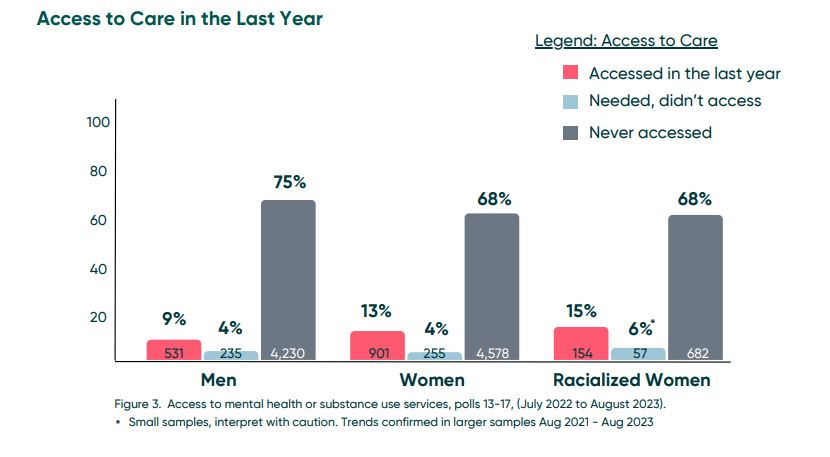A groundbreaking study conducted by GreenShield Cares in collaboration with Mental Health Research Canada (MHRC) has uncovered alarming trends concerning women’s mental health in the wake of inflation in the country.
The GreenShield Cares Women’s Mental Health Report released on Thursday highlights that women, especially those from marginalized groups, are bearing the brunt of financial struggles, with 71 percent stating that inflation is adversely affecting their mental well-being.
The report sheds light on how women’s financial habits have undergone significant changes over the past year due to skyrocketing living costs, exacerbating the challenges of accessing mental health support.
The study surveyed around 6,000 women and 5,600 men between July 2022-August 2023.
Notably, women who needed mental health care but did not seek it were twice as likely to cite financial barriers as their reason compared to men.
“From relying on savings or credit to pay for essential living costs to borrowing money from friends and family, these new findings paint the picture that women are disproportionately impacted by our current economic conditions,” GreenShield Vice President of Mental Health, Harriet Ekperigin said in a statement.
“Layer in the unique experiences of women from racialized and marginalized communities, it’s no surprise that these everyday stressors continue to affect their mental health.”

Graph via MHCR.
Read more: Canada braces for mild recession amid US downturn and inflation: Deloitte report
Read more: Canadians worried about inflation but will spend on gifts this season: CPA survey
Women of Colour and 2SLGBTQIA+ report higher rates of anxiety and depression
The report reveals that 16 percent of women consistently report more severe symptoms of anxiety, and 17 percent report symptoms of depression, a concerning trend that is even more pronounced among racialized women and those identifying as 2SLGBTQIA+.
Although women are more likely to access mental health services, racialized and marginalized groups are less satisfied with the care they receive. Overall, 13 percent of women report accessing mental health or substance abuse services in the past year.
A striking 42 percent of women who needed care but didn’t access it cited financial barriers as their reason, compared to 21 percent of men.
“Partnering with a company like GreenShield, with a social mission at its core, allows us to dig deep and shine a light on the realities of what Canadian women of all walks of life are grappling with,” MHRC CEO Akela People said.
“We are honoured to help tell the stories of these women, and we hope these insights can help pave the way to alleviate the current burden on women’s health.”

Graph via MHCR.
Read more: ‘Danksgiving’ survey indicates high holiday cannabis expenditure: Ayr & Suzy
Read more: SkipTheDishes launches online ‘Inflation Cookbook’ to help people find cheap food
New program offers free therapy
To address the challenges revealed in the report, GreenShield Cares’ Women’s Mental Health program is offering free national, culturally safe therapy and mental health services to Canadian women aged 18 and above.
The program includes two free hours of talk therapy with a licensed mental health professional, a one-year subscription to online cognitive-behavioral therapy (iCBT) guided by a coach, and access to an online wellness hub.
Importantly, the program prioritizes intersectionality in the matching process, reflecting the diversity of Canadians in its pool of certified practitioners. Over 50 matching options, including culture, race, language, and religion, ensure that women can find a certified mental health professional who can relate to their identity and lived experiences.
Harriet Ekperigin emphasized, “Offering free mental health resources is one way we can break down barriers to give women from coast-to-coast the support they need,” said Ekperigin.
“It’s one of the differentiators that makes the GreenShield Cares Women’s Mental Health program truly unique.”
GreenShield Cares aims to invest $75 million to improve the lives of at least one million Canadians by 2025.














